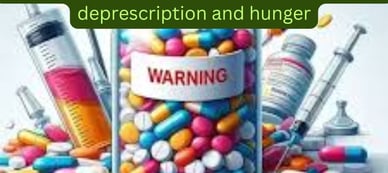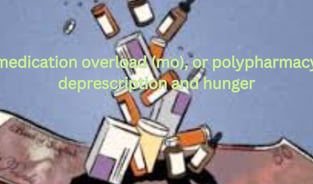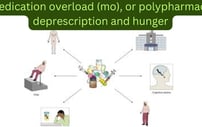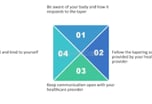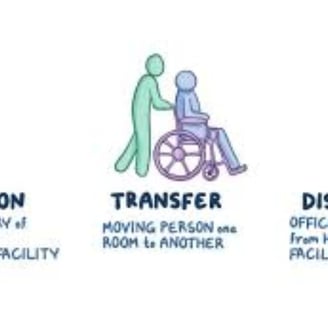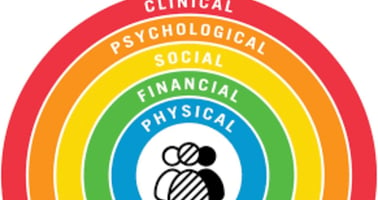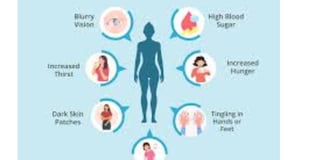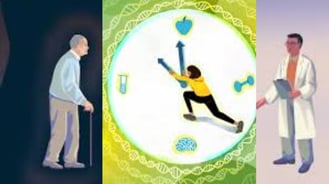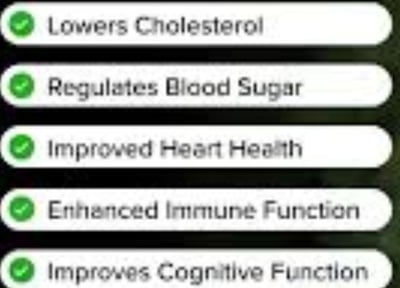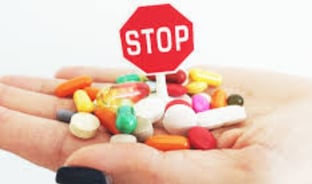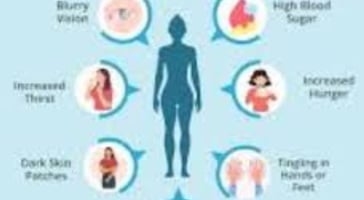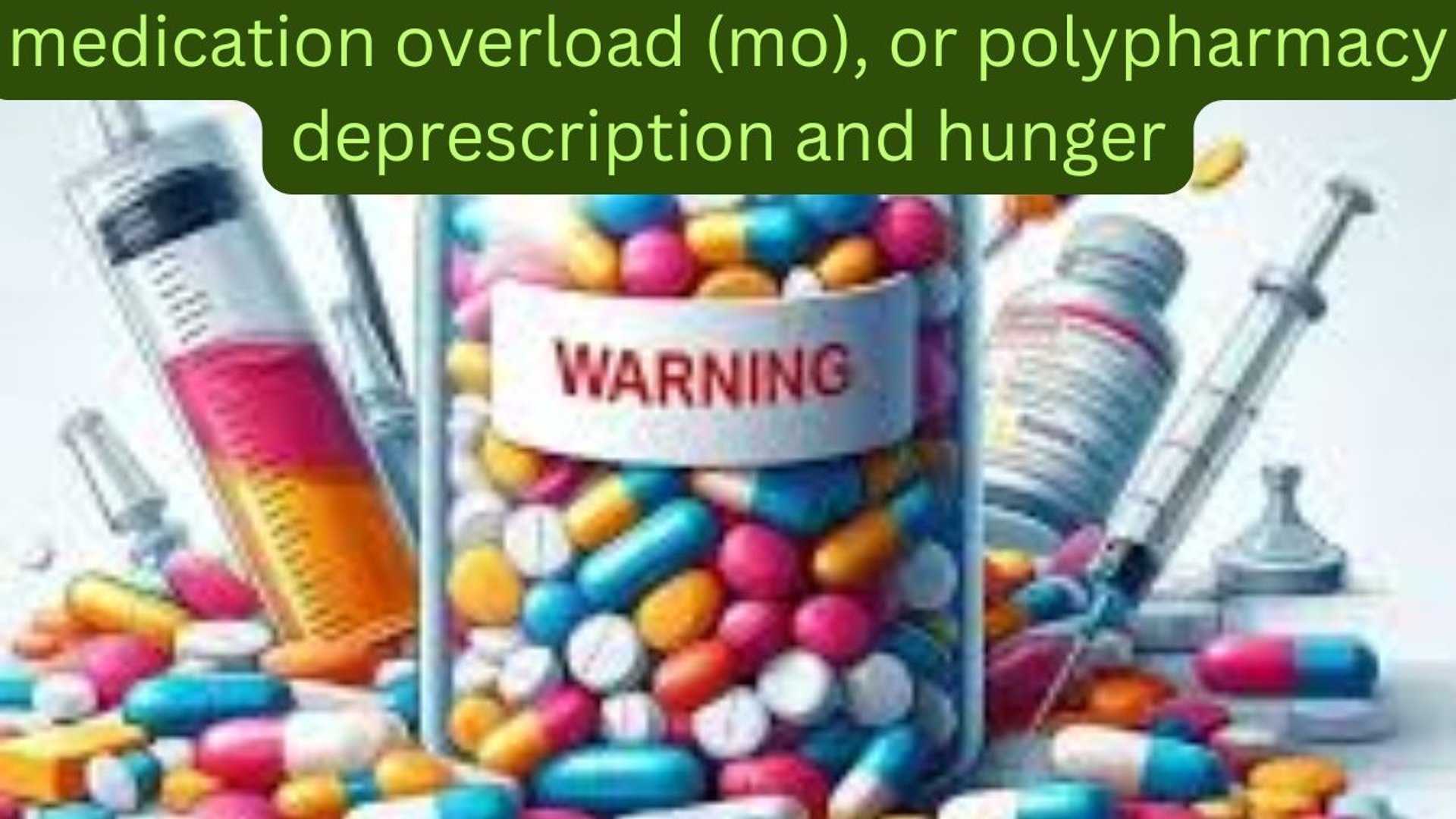
Medication Overload and hunger for Better Health
Learn about medication overload (MO) and the benefits of fasting, deprescription, calorie restriction, and more for improving health and longevity. Explore how these practices can help with weight loss, brain function, and insulin sensitivity.
PHARMACY
Dr Hassan Al Warraqi
8/24/2024


Medication Overload and hunger for Better Health
polypharmacy, refers to the use of multiple medications by a patient, often more than clinically necessary
This can lead to significant health risks, especially for older adults
involves taking five or more medications simultaneously
necessary for managing multiple chronic conditions like diabetes hypertension and hyperlipidemia but often leads to adverse effects
the higher the risk of drug interactions, side effects, and complications such as confusion, dizziness, and even internal bleeding
Older adults are particularly vulnerable due to changes in how their bodies metabolize drugs
deprescribing unnecessary medications, and ensuring that the benefits of each medication outweigh the risks
Medication overload (MO), or polypharmacy IN OLD AGES
Increased Sensitivity: As people age, their bodies process medications differently
and a higher risk of adverse effects
Multiple Chronic Conditions: Older adults often have multiple chronic conditions that require various medications
increasing the complexity
Risk of Interactions: the higher the risk of drug interactions, which can lead to serious health issues such as falls, confusion, and hospitalizations
Cognitive Decline:making it harder for older adults to manage their medications correctly
Adverse Drug Events: Older adults are more susceptible to adverse drug events
which can lead to emergency room visits and hospitalizations
Strategies to Manage Polypharmacy in Older Adults
Regular Medication Reviews: to ensure they are still necessary and beneficial
Deprescribing: reduction or stopping of medications that may no longer be needed or that pose more risks than benefits
Simplifying Regimens: reduce the risk of errors and improve adherence
Patient Education: risks of polypharmacy and the importance of medication management
Tools like pill organizers, medication management apps, and reminders
Deprescribin
reducing or stopping medications that may no longer be beneficial or might be causing harm
It’s an important especially in older adults
Minimize medications to reduce the risk of adverse effects and interactions
Improve Quality of Life overall well-being by eliminating unnecessary medications
Prevent Adverse Drug Events Decrease side effects and complications from multiple medications
Deprescribing Process
Medication Review: A thorough review of all current medications
Assessment: Evaluate each medication for its current benefit, potential harm, and necessity
patient’s overall health, life expectancy, and goals of care
Prioritization: Identify which medications can be safely reduced or stopped
prioritizing medications that have the highest risk of harm or the least benefit
step-by-step plan for tapering or discontinuing medications
gradually and under medical supervision to monitor for withdrawal symptoms or the return of the condition being treated
Monitoring: Regular follow-up to assess the patient’s response to deprescribing and make any necessary adjustments
Challenges and Considerations
Patient and Caregiver Involvement they understand the reasons and are comfortable with the changes
Clear communication between healthcare providers, patients, and caregivers is essential to ensure a smooth and safe transition
Deprescribing should be tailored to each patient’s unique situation, considering their health status, preferences, and treatment goals
Steps to Start Deprescribing
Pharmacist:
They can provide valuable insights into potential drug interactions and the necessity of each medication.
Gather Information Medication List:
comprehensive list of all medications your parent is taking, including prescriptions, over-the-counter drugs, and supplements
Medication reconciliation is the process of creating the most accurate list possible of all medications a patient is taking
This includes prescription drugs, over-the-counter medications, and supplements
Why is Medication Reconciliation Important
Prevents Medication Errors: it reduces the risk of errors such as omissions, duplications, dosing errors, or drug interactions
Improves Patient Safety: Accurate medication lists help prevent adverse drug events
Enhances Communication:
Verification:
Collect a complete and accurate list including the patient, caregivers, and previous healthcare records
Clarification:
medications and doses to ensure they are appropriate for the patient’s current condition
Reconciliation:
verified list with the new medication orders to identify and resolve any discrepancies
When is Medication Reconciliation Performed
Admission:
Transfer:
Discharge:
Medication reconciliation is a vital part of patient care that helps ensure safety and continuity of treatment
fasting and hunger deprescribing and reconciliations
fasting is very important deprescribing and reconciliations
for example fasting help to reduce blood pressure
fasting help in reduction of medicines in all aspect
help in reduce the side effect of medicine especially chemotherapy
Fasting may be the cause of weight loss, blood sugar control, and protection against medical conditions like cancer and neurodegenerative disorders
A* Promotes blood sugar control by reducing insulin resistance
Intermittent fasting and alternate-day fasting may help decrease blood sugar levels and reduce insulin resistance.
B* Promotes better health by fighting inflammation
While acute inflammation is a natural immune process used to help fight off infections, chronic inflammation can seriously affect your health.
be involved in the development of chronic conditions, such as heart disease, cancer, and rheumatoid arthritis.
fasting can help decrease levels of inflammation and promote better health.
reduce levels of C-reactive protein, which is a marker of inflammation
fasting along with resistance training could decrease several markers of inflammation and may be useful in treating inflammatory conditions.
C*May enhance heart health by improving blood pressure, triglycerides, and cholesterol levels
Heart disease is considered the leading cause of death worldwide
fasting reduce your risk of heart disease
alternate-day fasting could reduce levels of total cholesterol and several risk factors for heart disease in people with overweight compared to a control group.
that alternate-day fasting could significantly decrease blood pressure, as well as levels of blood triglycerides, total cholesterol, and LDL (bad) cholesterol.
Fasting has been associated with a lower risk of coronary heart disease and may help lower blood pressure, triglycerides, and cholesterol levels.
D* May boost brain function and prevent neurodegenerative disorders
that fasting could have a powerful effect on brain health
help relieve inflammation, it could also aid in preventing neurodegenerative disorders.
fasting may protect against and improve outcomes for conditions such as Alzheimer’s disease and Parkinson’s disease
However, more studies are needed to evaluate the effects of fasting on brain function in humans.
fasting could improve brain function, increase nerve cell synthesis, and protect against neurodegenerative conditions, such as Alzheimer’s disease and Parkinson’s
E*. Aids weight loss by limiting calorie intake and boosting metabolism
fasting to try to lose weight
increased weight loss over time
intermittent fasting was more effective in inducing weight loss compared to continuous calorie restriction
fasting may lead to greater reductions in body fat and belly fat compared to continuous calorie restriction
summary
Fasting may increase metabolism and help reduce body weight and body fat
F*. Increases growth hormone secretion, which is vital for growth, metabolism, weight loss, and muscle strength
Human growth hormone (HGH) is a protein hormone central to many aspects of your health
this key hormone is involved in metabolism OF weight loss, and muscle growth
fasting could naturally increase HGH levels.
Studies show that fasting can increase levels of human growth hormone (HGH), an important protein hormone that plays a role in growth, metabolism, weight loss, and muscle strength
G*. Could extend longevity
the potential lifespan-extending effects of fasting
fasting increased the diversity of helpful bacteria in the gut microbiome, including the Christensenella species, which are related to longevity
increase in sirtuins, proteins involved in metabolic regulation that are also associated with longevity
fasting could be effective in increasing longevity and delaying disease
how fasting may impact longevity and aging in humans and which fasting plans are most effective
fasting could delay aging and increase longevity
H*. May aid in cancer prevention and increase the effectiveness of chemotherapy
that intermittent fasting may benefit the treatment and prevention of cancer in some situations
It may decrease tumor growth and toxicity from chemotherapy in some people
fasting could reduce tumor progression and increase chemotherapy’s effectiveness
how fasting may influence cancer development and treatment in humans.
fasting could block tumor development and increase the effectiveness of chemotherapy
How to start fasting
Here are a few of the most common types of fasting:
ISLAMIC FASTING
NO FOOD OR DRINKS OR SEX FROM FAJER TIME TO MAGREB TIME
Water fasting:
Involves drinking only water for a set amount of time
Juice fasting:
This entails only drinking vegetable or fruit juice for a certain period
Intermittent fasting:
Intake is partially or completely restricted for a few hours up to a few days at a time, and a regular diet is resumed on other days
Partial fasting:
Certain foods or drinks such as processed foods, animal products, or caffeine are eliminated from the diet for a set period
Calories are restricted for a few days every week
intermittent fasting can be broken down into subcategories, such as alternate-day fasting, which involves eating every other day, or time-restricted feeding, which entails limiting intake to just a few hours each day.
There are different ways to practice fasting, which makes it easy to find a method that fits into just about any lifestyle
Experiment with different types to find what works best for you.
Fasting may not be suitable for everyone and may cause side effects.
fasting can lead to spikes and crashes in your blood sugar levels, which could be dangerous.
It’s best to talk with a doctor first if you have any underlying health conditions or are planning to fast for more than 24 hours.
fasting is not generally recommended without medical supervision for older adults
adolescents, people with underweight, or people undergoing cancer treatment
If you decide to try fasting, be sure to stay well-hydrated and fill your diet with nutrient-dense foods during your eating periods to maximize the potential health benefits
to minimize intense physical activity and get plenty of rest
When fasting, be sure to stay hydrated, eat nutrient-dense foods, and get plenty of rest. It’s best to consult with a doctor before fasting if you have any underlying health conditions
Fasting may have potential health benefits, weight loss, improved blood sugar control, heart health, brain function, and cancer prevention
When coupled with a nutritious diet and healthy lifestyle, incorporating fasting into your routine could benefit your health
webmd
https://www.webmd.com/healthy-aging/medication-overload
https://www.h-k-e-m.com/medication-overload-and-hunger-for-better-health
healthline
https://www.healthline.com/nutrition/intermittent-fasting-metabolism
https://www.nytimes.com/2024/04/22/well/live/medication-prescription-drug-use.html
hopkinsmedicine
FAQs on Medications, Hunger, and Satiety
What is "ABCD," and how can it help doctors and patients make better decisions about medications based on direct-to-consumer advertising (DTCA)?
"ABCD" refers to a drug assessment framework focusing on Adverse Drug Effects (ADEs), Benefits, Cost, and Diagnosis appropriateness.
It guides clinicians and patients in evaluating whether a medication aligns with the patient’s condition, balances risks and benefits, and is cost-effective, countering potential biases from DTCA.
How do GLP-1 medications like Ozempic and Mounjaro reduce weight, and what is their primary mechanism of action?
GLP-1 agonists (e.g., semaglutide/Ozempic, tirzepatide/Mounjaro) primarily suppress appetite by targeting brain regions such as the nucleus of the solitary tract and area postrema in the brainstem.
These areas receive signals via the vagus nerve, reducing food cravings and enhancing satiety, leading to lower calorie intake and weight loss.
What is leptin’s role in appetite regulation, and how does it affect AgRP neurons in the hypothalamus?
Leptin, a hormone secreted by fat cells, signals long-term energy stores.
It inhibits AgRP neurons in the hypothalamus, which promote hunger.
High leptin levels (indicating sufficient fat stores) suppress appetite, while low levels increase hunger.
How does ultraviolet (UV) light influence appetite, and what is the role of MSH in this process?
UV light exposure stimulates the pituitary gland’s release of melanocyte-stimulating hormone (MSH) through ocular pathways.
MSH suppresses appetite, potentially explaining why sunlight exposure may reduce hunger in some individuals.
What are the risks of ultra-processed foods, and how do they disrupt satiety signals?
Ultra-processed foods often contain emulsifiers that damage intestinal mucus layers and impair gut nerve function.
This disrupts the release of satiety hormones like cholecystokinin (CCK), leading to overconsumption due to blunted fullness signals.
What key considerations should nurses follow when administering aspirin to children or teens?
Nurses must:
Check for aspirin allergies.
Avoid aspirin in children with chickenpox or flu-like symptoms due to the risk of Reye’s syndrome, a severe neurological and hepatic condition.
How do spironolactone and chlorothiazide differ in their effects on potassium levels?
Chlorothiazide (a thiazide diuretic) increases sodium/water excretion but lowers potassium (hypokalemia risk).
Spironolactone (a potassium-sparing diuretic) retains potassium, requiring monitoring for hyperkalemia.
What is disulfiram (Antabuse), and how does it aid in alcohol use disorder?
Disulfiram inhibits the enzyme acetaldehyde dehydrogenase, causing severe reactions (flushing, nausea, headache) upon alcohol consumption.
This aversion therapy discourages drinking.
Voluntary Islamic Fasting, Medication Overload, and the Pursuit of Better Health
1. Understanding Medication Overload
Medication overload occurs when individuals (especially older adults with chronic conditions) take multiple drugs, leading to adverse effects and reduced quality of life.
Strategies to minimize unnecessary medications are critical.
2. Health Benefits of Islamic Fasting
Metabolic Improvements: Fasting during Ramadan or voluntary days (e.g., Mondays/Thursdays) enhances insulin sensitivity, aids weight loss, and reduces inflammation, potentially lowering reliance on diabetes or hypertension drugs.
Spiritual and Behavioral Impact: Fasting fosters mindfulness and self-discipline, promoting healthier lifestyles (e.g., smoking cessation, balanced diets) that reduce long-term medication needs.
Intermittent Fasting Parallels: Similar to time-restricted eating, Islamic fasting improves metabolic markers, though cultural and timing differences warrant tailored research.
3. Risks and Challenges
Medication Timing: Fasting may disrupt dosing schedules (e.g., NSAIDs requiring food, precise timing for anticoagulants), risking inefficacy or toxicity.
Dehydration and Electrolyte Imbalance: Risks escalate in hot climates or with diuretics, affecting kidney function.
Cultural Misconceptions: Some may view fasting as a substitute for medical treatment, leading to unsafe medication discontinuation.
4. Vulnerable Populations
Elderly individuals or those with comorbidities (e.g., kidney disease, diabetes) face higher risks (e.g., hypotension, acute kidney injury).
Islamic exemptions for the ill must be emphasized.
5. Strategies for Safe Fasting
Healthcare Collaboration: Adjust regimens (e.g., extended-release drugs, dose timing) and educate patients on hydration/nutrition during non-fasting hours.
Patient Education: Teach medication management, recognize warning signs (e.g., dizziness), and stress pre-fasting medical consultation.
Community Support: Families and religious leaders should promote health-conscious fasting aligned with medical advice.
6. Ethical and Cultural Considerations
Islam prioritizes health, permitting exemptions for illness.
Open dialogue among patients, providers, and religious leaders harmonizes faith practices with health needs.
Conclusion
Voluntary Islamic fasting offers metabolic and behavioral benefits that may reduce medication overload.
However, personalized healthcare plans, education, and community support are vital to mitigate risks.
Balancing spiritual devotion and medical safety ensures holistic well-being.
medication overload (mo), polypharmacy ,deprescription ,fasting,Calorie restriction,cancer treatment,intermittent fasting,Calorie restriction,ISLAMIC FASTING,delay aging,extend longevity,growth hormone (HGH),weight loss,polypharmacy,Deprescribing,reconciliation,WT LOSS,brain function,sugar,insulin sensitivity,
